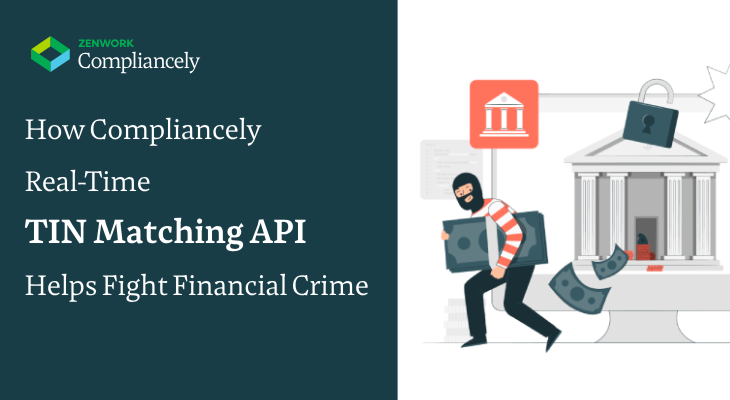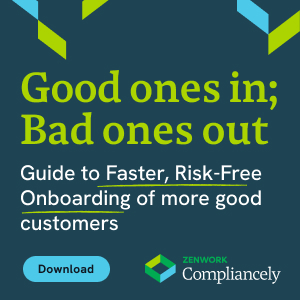How Compliancely Real-Time TIN Matching API Helps Fight Financial Crime

An economic crime and fraud survey conducted in 2020 by PricewaterhouseCoopers reveals the rate at which financial crime and fraud is increasing.
The stats show that 47% of the businesses around the world witnessed a financial crime at least 6 times during 24 months until 2020. The businesses in the survey also revealed that they have lost a total of $42 billion to financial fraud. This just goes on to show that financial crime has not only become common, but easier to do.
Despite businesses integrating the best technologies and solutions into their ecosystems, financial crime has become harder to grasp.
Many businesses believe that they could have prevented the financial crimes if they were able to properly vet their culprits.
Identifying an individual or an entity for who they claim they are is a necessity in today’s world. It is especially essential if you plan to work with them for the long term. Regular screening is no longer enough to validate the background.
Sure, it will give you a pretty good picture of their criminal and health history, but not so much on the compliance front.
If you were to meet with a person who is known for their notorious noncompliance practices, such as non-filing of taxes, penalties piling up on their business, not in good standing with the federal authorities, and so on. Would you still sign up for a contract with them?
The answer would be a hard ‘no’.
In this scenario, you were able to make a wise decision for your business because the situation was made pretty transparent and you were informed of all the details which qualified the party as fraudulent.
And this is exactly what lacks in a real-life business scenario – transparency.
Businesses & KYC
Many businesses integrate a simple Know Your Client/Customer process, which allows them to identify and verify the information of an incoming party through certain authorized documentation, such as social security number, employment proof, passport, driving license, and more.
While this information is enough to identify and verify an individual’s personal information against the federal records, it is not enough to verify the business, financial, and tax compliance history of an individual.
But you know what will ascertain in such a scenario? Real-time TIN Matching. Real-time TIN matching allows you to validate the tax information, such as the taxpayer identification number and the ‘doing business as’ name against the IRS records, allowing you to check if the individual is in good standing with the IRS and if they are compliant.
Tracking Financial Transactions
Every major financial transaction involves all the parties in the contract to provide substantial evidence for identification, and this information includes the TIN and name of the individual. You can track all the financial transactions associated with the TIN/SSN and trace the offenders.
Instrumentally, TINs are sometimes used against their purpose.
Some individuals carry multiple social security numbers or TINs. Repeat offences or noncompliant financial activities are recorded and tracked along with the TINs, and to avoid the federal authorities, some individuals carry more than one TIN, which gives them a free pass.
The TINs provided by the individuals could often be a false positive, making their profile look compliant (even if they have a noncompliant history) but if you dig deeper and run other identification checks, you will be able to nab if they are who they say they are.
Validating Tax Information
Most financial crimes can be prevented with a simple TIN validation. And with today’s progressive compliance verification interfaces, such as Compliancely, you can easily identify, validate, and verify if the TIN and personal information provided by your vendors or customers are following the IRS records.
You can further validate if an individual is compliant with the regulatory reporting regimes and if they have been assessed by the IRS for noncompliance.
Verifying Incoming Vendors & Customers
Businesses primarily in banking, lending, finance, e-commerce, health care, and other industries deal with a large inflow of vendors and customers. It is hard to keep track of the regulatory reporting and tax compliance status of each of the individuals involved in such ecosystems.
Since there are countless transactions involved to facilitate operations and keep things running, a TIN-Matching API comes in handy to enable these businesses to stay compliant throughout the year without compromising productive time.
You can validate the tax information of any individual at any time of the year, helping you proof your records and validate the information against the IRS records.
Optimize your quarterly audits, maintain your records accurately, report compensatory payments in your informational returns with accurate TINs, and process payments to verified vendors with Compliancely.
Integrating Compliancely Real-Time TIN Matching API Into Your Business Ecosystem
Compliancely is a business identification API used by thousands of businesses around the world to scale up their identity validation processes. Our real-time TIN Matching API is designed to enable businesses like yours to identify TINs, validate them according to the IRS records, and verify the regulatory compliance status.
With this real-time TIN Matching API, you can check as many as 100,000+ TINs in a day and get results in less than 30 seconds.
Have a look at all the industries leveraging Compliancely’s real-time TIN Matching API.
Compliancely can be scaled according to your requirement. This means, apart from the TIN validation, you can also use our dynamic infrastructure to identify and validate business and regulatory compliance per the following authorized databases and watch lists.
- TIN & Name Match
- OFAC Watch List
- European Sanctions List
- Death Master File
- Specially Designated Nationals
- Politically Exposed People
- IRS Tax-Exempt Org. Search
- Foreign Account Tax Compliance Act (FATCA) List
- Address Validation
- Denied person List
- SOS Business Entity Search
- Consolidated Sanctions
- Arms Export Control Act
- Foreign Sanctions Evaders List
- Excluded Parties List System
- List Of Excluded Individuals/Entities
- Designated Foreign Terrorist Organizations

